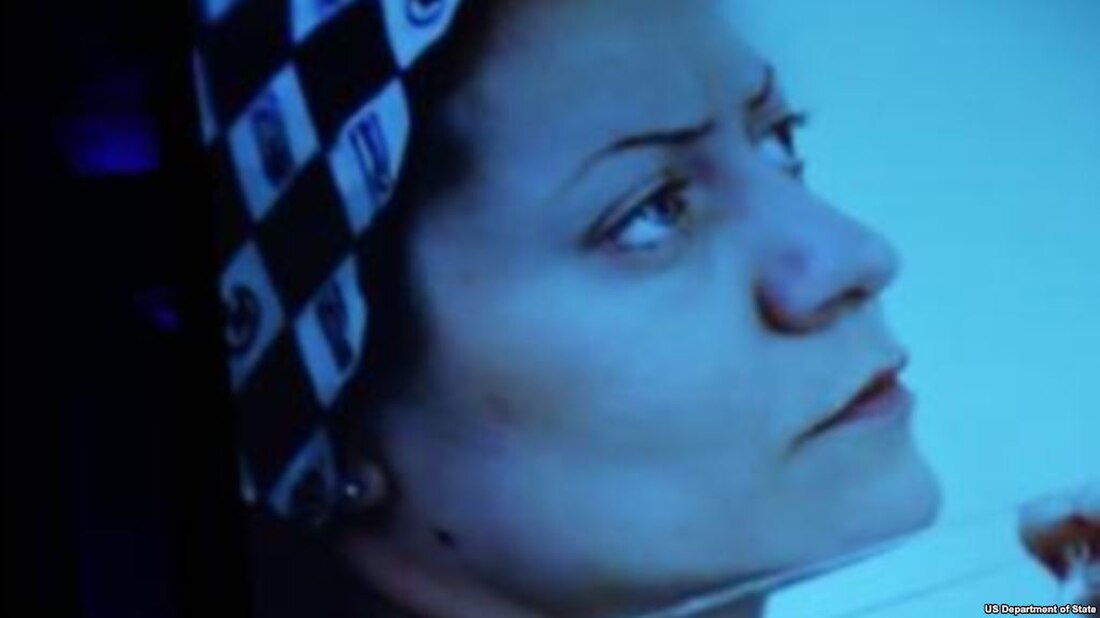Top Qs
Timeline
Chat
Perspective
Razan Zaitouneh
Syrian human rights lawyer and activist From Wikipedia, the free encyclopedia
Remove ads
Razan Zaitouneh (sometimes spelled Zeitunah; Arabic: رزان زيتونة; born 29 April 1977) is a Syrian human rights lawyer and civil society activist. Actively involved in the Syrian uprising, she went into hiding after being accused by the government of being a foreign agent[3] and her husband was arrested.[4] Zaitouneh has documented human rights in Syria for the Local Coordination Committees of Syria.[5] Zaitouneh was kidnapped on 9 December 2013, most likely by Jaysh al-Islam. Her fate remains unknown. It is suspected that she has been killed.[1][2]
Remove ads
Education
Zaitouneh graduated from law school in Damascus in 1999 and in 2001 started her work as a lawyer.[citation needed]
Legal and human rights activism
Summarize
Perspective
She has been a member of the team of lawyers for defense of political prisoners since 2001. In the same year, Razan was one of the founders of the Human Rights Association in Syria (HRAS). In 2005, Razan Zaitouneh established SHRIL (the Syrian Human Rights Information Link), through which she continues to report about human rights violations in Syria. From 2005 through to her 2013 disappearance, Razan Zaitouneh was an active member of the Committee to Support Families of Political Prisoners in Syria.
Syrian State television aired announcement that Razan Zaitouneh was a foreign agent on 23 March 2011, after which she went into hiding while continuing her legal and human rights work, in order to avoid being arrested.[6]
Zaitouneh founded the Violations Documentation Center in Syria in April 2011 to document human rights violations and abuses in the country by all sides.[7] She also contributed to human rights violations reports circulated by the Local Coordination Committees of Syria,[5] of which she was one of the founders.[1]
Her husband, Wael Hamadeh (or Wael Hamada, or Wa'el Hammada) was arrested on 12 May 2011. His brother 'Abd al-Rahman Hammada was also arrested. Wael Hamadeh was questioned in prison about his wife's human rights work, then Wael Hamadeh released on 1 August 2011.[8]
On 27 October 2011, she was awarded the 2011 Sakharov Prize for Freedom of thought, jointly with four other Arabs.[9] She was previously awarded the Anna Politkovskaya Award by Reach All Women in War.[10] In 2013 Razan Zaitouneh was granted the International Women of Courage Award.[11]
Remove ads
2013 disappearance
Summarize
Perspective
Pro-opposition websites reported that on 9 December 2013 Zaitouneh had been kidnapped along with her husband, Wael Hamadeh, and two colleagues, Samira Khalil and Nazem Hammadi, in the opposition-held town of Douma to the north of Damascus.[12][13][14] As of December 2015, their whereabouts were still unknown and the identity of the kidnappers uncertain, although it was suspected that the Islamist Salafi rebel group Jaysh al-Islam was responsible.[15][7]
As of August 2018[update], the Associated Press (AP) was unaware of significant evidence for Zaitouneh's fate. AP stated clues suggesting that Jaysh al-Islam had detained Zaitouneh and held her in Tawbeh Prison. Jaysh al-Islam denied the claim.[1] One clue was a graffito seen by several witnesses on a prison cell wall stating, "I miss my mother – Razan Zaitouneh, 2016." Another clue was the use of one of the Violations Documentation Center computers, taken together with Zaitouneh in the December 2013 kidnapping, from a Jaysh al-Islam IP address at Tawbeh Prison. Another opposition activist, Mazen Darwish, stated that Zaitouneh was held by Jaysh al-Islam until early 2017.[1] AP judged it likely that Zaitouneh had been killed.[1]
On 17 February 2020, one of the Syrian intelligence agencies declared that it had discovered a mass grave in al-Ub around the eastern Ghouta district, containing around 70 bodies. Russian sources speculated that of them appeared to be that of Razan Zaitouneh.[citation needed]
In 2020, French authorities arrested Majdi Mustapha Nameh (Islam Alloush) in relation to Zaitouneh's disappearance.[16]
In March 2021, a criminal complaint was filed in France by the International Federation for Human Rights (FIDH) and the Syrian Center for Media and Freedom of Expression, holding Jaysh al-Islam responsible for her abduction.[2]
In July 2022, a clue reported by Deutsche Welle was that two months after the abduction, a member of Jaysh al-Islam had used Zaitouneh's computer to log on to her social media accounts. The computer had been given to Zaitouneh through a project funded by the United States Department of State, enabling geolocation and identification of the user. The Deutsche Welle investigation suggested that the abduction had been masterminded by two local Jaysh al-Islam leaders, Abu Qusai al-Dirani and Samir Kaakeh. When the leader of Jaysh al-Islam at the time, Zahran Alloush, learnt about the abduction, he tried to negotiate an agreement to free her and three other abductees. However, Zahran Alloush was killed in a Russian airstrike. His successor and cousin, Mohammed Alloush, refused to continue the proposals for a deal.[16]
Remove ads
See also
Awards
- Sakharov Prize for Freedom of Thought 2011
- The 2011 Anna Politkovskaya Award[17]
- The Ibn Rushd Prize for Freedom of Thought for the year 2012 in Berlin
Notes and references
External links
Wikiwand - on
Seamless Wikipedia browsing. On steroids.
Remove ads

